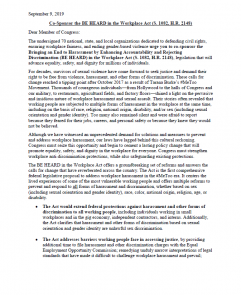 Co-Sponsor the BE HEARD in the Workplace Act (S. 1082, H.R. 2148)
Co-Sponsor the BE HEARD in the Workplace Act (S. 1082, H.R. 2148)
Dear Member of Congress:
The undersigned 70 national, state, and local organizations dedicated to defending civil rights, ensuring workplace fairness, and ending gender-based violence urge you to co-sponsor the Bringing an End to Harassment by Enhancing Accountability and Rejecting Discrimination (BE HEARD) in the Workplace Act (S. 1082, H.R. 2148), legislation that will advance equality, safety, and dignity for millions of individuals.
For decades, survivors of sexual violence have come forward to seek justice and demand their right to be free from violence, harassment, and other forms of discrimination. These calls for change reached a tipping point after October 2017 as a result of Tarana Burke’s #MeToo Movement. Thousands of courageous individuals—from Hollywood to the halls of Congress and our military, to restaurants, agricultural fields, and factory floors—shined a light on the pervasive and insidious nature of workplace harassment and sexual assault. Their stories often revealed that working people are subjected to multiple forms of harassment in the workplace at the same time, including on the basis of race, religion, national origin, disability, and/or sex (including sexual orientation and gender identity). Too many also remained silent and were afraid to report because they feared for their jobs, careers, and personal safety or because they knew they would not be believed.
Although we have witnessed an unprecedented demand for solutions and measures to prevent and address workplace harassment, our laws have lagged behind this cultural reckoning. Congress must seize this opportunity and begin to cement a lasting policy change that will promote equality, safety, and dignity in the workplace for everyone. Congress must strengthen workplace anti-discrimination protections, while also safeguarding existing protections.
The BE HEARD in the Workplace Act offers a groundbreaking set of reforms and answers the calls for change that have reverberated across the country. The Act is the first comprehensive federal legislative proposal to address workplace harassment in the #MeToo era. It centers the lived experiences of some of the most vulnerable working people and offers multiple reforms to prevent and respond to all forms of harassment and discrimination, whether based on sex
(including sexual orientation and gender identity), race, color, national origin, religion, age, or disability.
- The Act would extend federal protections against harassment and other forms of discrimination to all working people, including individuals working in small workplaces and in the gig economy, independent contractors, and interns. Additionally, the Act clarifies that harassment and other forms of discrimination based on sexual orientation and gender identity are unlawful sex discrimination.
- The Act addresses barriers working people face in accessing justice, by providing additional time to file harassment and other discrimination charges with the Equal Employment Opportunity Commission; remedying unduly narrow interpretations of legal standards that have made it difficult to challenge workplace harassment and prevail; removing artificial caps on damages so that working people can be made whole for the harm suffered; and providing funds to support legal assistance for low-income workers.
- The Act would increase transparency and accountability by prohibiting forced arbitration, banning nondisclosure agreements (NDAs) in the pre-dispute context, and limiting the use of NDAs in post-dispute agreements. These measures would help ensure harassment cannot continue to thrive in the shadows, while protecting working people’s ability to pursue their day in court. The Act would also give survivors the means to enter into agreements to keep confidentiality over some or all information related to their claims.
- The Act promotes harassment prevention by including provisions such as requirements for employer trainings and policies, and research on the prevalence and impact of workplace harassment on communities across the country.
- The Act would ensure that tipped workers are entitled to the same minimum wage as everybody else, rather than the current cash minimum wage of $2.13 an hour, ensuring women, who are two-thirds of the tipped workforce, are not compelled to tolerate sexual harassment from customers as the price of making an adequate living.
The BE HEARD in the Workplace Act offers a multi-faceted approach to preventing and responding to harassment and discrimination. It provides concrete solutions and a path to creating a world in which every individual can work with safety and dignity.
We urge you to prioritize the BE HEARD in the Workplace Act in the 116th Congress by cosponsoring this historic legislation. If you have any questions, please do not hesitate to contact Maya Raghu at the National Women’s Law Center, Vania Leveille at the ACLU, or Gaylynn Burroughs at The Leadership Conference on Civil and Human Rights.
Sincerely,
(see full list of 70 organizations here)

